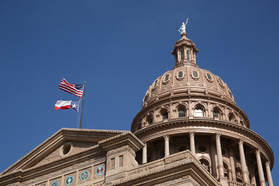
TORCH Advocacy for Rural Hospitals
TORCH is “the voice and principal advocate for rural and community hospitals in Texas and provides leadership in addressing the special needs and issues of our hospitals.”
TORCH carries out that mission statement through it's advocacy in two primary action areas:
1. Promote, support, and advocate for state and federal legislation, rules, regulations, and funding that assists Texas rural hospitals with operational issues and financing, and helps them carry out their mission to serve their communities.
2. Oppose laws, rules, regulations and funding cuts that create operational and financing burdens for Texas rural hospitals.
The TORCH advocacy effort is very much member driven at a grassroots level. Member hospitals set the advocacy agenda through their input and prioritize efforts on a consensus basis. Member hospitals also lead the advocacy efforts with the support of professional staff by outreach and communications to their elected officials.
2011
TORCH is “the voice and principal advocate for rural and community hospitals in Texas and provides leadership in addressing the special needs and issues of our hospitals.”
TORCH carries out that mission statement through it's advocacy in two primary action areas:
1. Promote, support, and advocate for state and federal legislation, rules, regulations, and funding that assists Texas rural hospitals with operational issues and financing, and helps them carry out their mission to serve their communities.
2. Oppose laws, rules, regulations and funding cuts that create operational and financing burdens for Texas rural hospitals.
The TORCH advocacy effort is very much member driven at a grassroots level. Member hospitals set the advocacy agenda through their input and prioritize efforts on a consensus basis. Member hospitals also lead the advocacy efforts with the support of professional staff by outreach and communications to their elected officials.
- TORCH reviews proposed state and federal legislation that will impact rural hospitals.
- TORCH regularly visits Texas legislative offices and testifies in state legislative hearings on bills and other state issues that impact rural hospitals.
- TORCH visits Texas delegation congressional offices in Washington, advises the offices on the impact of federal issues on rural hospitals, and provides written testimony on occasion to congressional committees.
- TORCH participates in ongoing communications and coordination with other Texas hospital associations and the National Rural Health Association.
- TORCH maintains communications with state agencies and addresses specific issues with those agencies that have financial or regulatory impact on rural hospitals (HHSC, DSHS, Pharmacy Board, etc.)
- TORCH regularly reviews proposed state and federal rules that will impact rural hospitals, and submits official comments as needed.
- TORCH provides updates to member hospitals about state and federal issues impacting them.
- TORCH alerts member hospitals when it is advisable to contact their state and federal representatives and assists with messaging.
- TORCH works with local, state, and national news media to promote stories that further the efforts of rural hospitals and address their challenges.
2011
- Successfully changed the state law (again) to allow physicians to be direct employees of rural hospitals. The bill was not vetoed by the Governor and became law.
- Alternative rural hospital pool of funds created in the 1115 waiver which provided more dollars to rural hospitals.
- Successfully secured changes in a proposed hospital penalty bill in the Texas Legislature to elevate daily penalties for hospital violations to $25,000 where rural hospital penalties would be limited to a cap of $10,000 and the hospital’s financial status would have to be taken into account in assessing the penalty (this bill has yet to be passed although filed in 2013, 2015 and 2017 sessions).
- TORCH gains changes in proposed state neonatal rules to reduce cost of compliance for rural hospitals providing obstetrical services.
- State budget rider added to increase rural hospital outpatient Medicaid payments by over $30 million a year.
- Instrumental in securing a two-year extension for hospitals to comply with new Texas maternal and neonatal rules.
- Protected the rural hospital pharmacy supervision system which was proposed by the State Board of Pharmacy for the state Legislative session to be abolished, which would have imposed substantial cost on many rural hospitals.
- Protected the $30 million-dollar Medicaid outpatient enhanced payments for rural hospitals passed in 2015 by the Texas Legislature in the face of Medicaid reductions discussed in the 2017 session.
- Successfully persuaded the state Pharmacy Board rule to reverse its decision to require prescriptions issued in a rural hospital be reviewed by a pharmacist in advance at all times a tech fills the prescription.
- Contributed to national efforts to have Medicare Dependent Hospital and Low Volume Adjustment hospital designations revived and extended for five years.
- Passage of state law that requires rural hospitals be paid cost in Medicaid (SB170).
- Successfully secured from the Texas Legislature an additional $53 million a year in Medicaid payments for Texas rural hospitals to partially offset losses from treating Medicaid patients.
- Retained hospital districts under the 8% property tax increase limit without a local election rather than being decreased to a 3.5% cap for cities and counties, and a 2.5% for public schools. This is important as hospitals districts use those tax dollars to provide state mandated indigent health care services and as match money to draw down federal supplemental payment dollars.
- Secured law change to allow small rural hospitals in counties with 30,000 and less population the option to provide emergency room physician coverage via telemedicine and maintain their trauma designation.
- Helped secure greater than $800 million in federal stimulus payments to rural Texas hospitals.
- Successful addition of public hospitals to PPP ($150 million.)
- Successful delay of DSH & Sequestration cuts ($33 million.)
- Achieved state appropriations for targeted Medicaid rate enhancement; $62 million/year outpatient, $45 million/year inpatient, and $8 million/year in OB.
- Secured $75 million allocation to rural hospitals from ARP.
- Extended LVA/MDH through continuing resolution then legislation.


